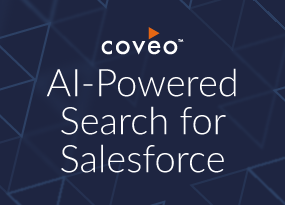Salesforce Commerce Cloud Einstein & Coveo for Salesforce
“Welcome to the age of artificial intelligence, the world will never be the same again and it’s going to happen really quickly,” said Simon Mulcahy, CMO, Salesforce, at the London leg of its World Tour.
Salesforce has ramped up its Commerce Cloud Einstein platform with new AI-powered  personalization capabilities to enable retailers to build, manage and promote their online storefronts while ensuring every touchpoint with their consumers is relevant to their interests. The new features include Order Management, Predictive Sort, Mobile Site Reference Architecture blueprints and Google Android Pay integration.
personalization capabilities to enable retailers to build, manage and promote their online storefronts while ensuring every touchpoint with their consumers is relevant to their interests. The new features include Order Management, Predictive Sort, Mobile Site Reference Architecture blueprints and Google Android Pay integration.
For those who are not acquainted with Salesforce’s Einstein platform, it provides advanced artificial intelligence capabilities across Salesforce’s clouds for marketing, service, sales, apps, analytics, and commerce. Einstein AI capabilities such as Einstein Product Recommendations and Einstein Commerce Insights have already been baked into The Commerce Cloud which powers 2,000 commerce websites and serves 400 million unique shoppers in 53 countries that sold more than $16 billion in merchandise last year alone. To put the adoption rate of the product into context, Salesforce Commerce Cloud generated a whopping 15 billion emails on last year's Black Friday.
Einstein Shops Smart
Announced at the company’s Salesforce XChange conference that took place in Las Vegas, the new Einstein Predictive Sort employs a machine learning algorithm to mine customer data such as purchase history and Web behavior and pushes products that the customer will most likely be interested in to the top of search results. Even though Salesforce, previously, upgraded its Predictive Sort for product recommendations, with this new enhancement, this capability has been expanded in order to personalize search drop-down results and product category pages appearing on eCommerce sites.
While in the past search results appearing on the first page was a concern, today, given the size of screen real estate on mobile, users have switched their focus to the top three results. Therefore, having a personalized product layout displayed on search and category pages not only saves time for shoppers but also increases the odds of conversion for retailers.
The new capabilities are expected to be generally available in July and the good news is, the company claims that this integration can be added to an e-commerce site in just a few clicks, with no extra support needed from developers or Salesforce. Here is an example of the drop-down search results powered by the updated Predictive Sort when a user looks up women’s clothes:

Order Management and Android Pay Integration
Salesforce has injected Einstein within its Commerce Cloud's new order management tools to provide retailers with intelligent algorithms that build a correlation between customer demand and inventory supply in the fastest and cheapest way possible. According to Salesforce, the new feature is designed to support specifically “buy anywhere, fulfill anywhere” scenarios such as buy online/pickup in-store and ship from store.
Adding to an earlier support for Apple Pay, Commerce Cloud now allows Android Pay. With Android Pay, customers can pay exactly how they wish, without adding effort on the retailer's front. This is important not only because of the convenience of fast, hassle-free checkouts, but also for the support for secure mobile payments, considering 51 percent of Global Citizens with internet access are discouraged by the lack of trust online, choosing to not engage in online transactions due to privacy and security concerns, according to a new Ipsos survey for the Centre for International Governance Innovation.
Android Pay integration is scheduled for August availability. I also expect that Salesforce will integrate with some of the other major mobile payment platforms in the near future.
“We’re excited to deliver Android Pay seamlessly inside of Salesforce Commerce Cloud,” Pali Bhat, Global VP of Payment Products at Google commented. "Android Pay makes mobile checkout easy. Shoppers no longer need to enter their card details, they can just choose Android Pay and authenticate with their device to speed through checkout."
New Mobile Site Reference Architecture
BI Intelligence forecasts that by 2020, mobile will account for 45% of the nation’s $632 billion in total e-commerce sales, meaning that online retailers who don’t have a responsive design are really going to lose out. Therefore, for those who haven’t optimized their mobile shopping experience yet, Salesforce’s new Mobile Site Reference Architecture can be appealing as it provides retailers with an out-of-the-box mobile website blueprint which is a clear guideline incorporating many best practices in mobile site design, merchandising and technical architecture.
Having the unique and aesthetic appearance along with basic easy-to-use navigational features is crucial, as the first impression is made by the site’s design and that’s mostly when a retailer is destined either to make a splash or to mar its business.
Coveo Announces Full “Family of Products” for Salesforce
Last month, here at CMS-Connected, we reported on the news that Coveo, a provider of  intelligent search technology, announced the general availability of Coveo for Salesforce Free Edition to offer a fast, barrier-free onramp that infuses AI-powered search technology directly within Salesforce Community and App Clouds. Last week, the technology provider announced the release of Coveo Pro Edition for Salesforce. This addition completes the family of Coveo products for Salesforce, which includes the Free and Express Editions released last month, as well as the Enterprise Edition.
intelligent search technology, announced the general availability of Coveo for Salesforce Free Edition to offer a fast, barrier-free onramp that infuses AI-powered search technology directly within Salesforce Community and App Clouds. Last week, the technology provider announced the release of Coveo Pro Edition for Salesforce. This addition completes the family of Coveo products for Salesforce, which includes the Free and Express Editions released last month, as well as the Enterprise Edition.
Since the Coveo for Salesforce Family of Products is built on the same cloud-based platform with Coveo Machine Learning at its core, the company reassures its customers that moving up to Pro and Enterprise Editions won’t cause business disruptions or IT headaches. The company noted that Coveo Pro Edition customers can add cloud-based content from sources including Salesforce, websites, sitemaps, YouTube, SharePoint Online, Atlassian’s Confluence Cloud, Atlassian’s Jira Cloud, RSS feeds, Google Drive, Amazon S3, Dropbox, and Box; and push other content to Coveo using a framework of APIs.
With the release of the Coveo Pro Edition, every Salesforce-based support team can quickly and easily add cloud-based content sources to their Community Cloud and Service Cloud organizations, allowing Coveo’s AI-powered search to surface personalized, relevant content and insights to agents, partners, and community members.
What’s Next for Einstein?
Salesforce’s Commerce Cloud updates came a day prior to when the enterprise cloud computing company reported its fiscal first-quarter earnings. Earnings reported were record high revenues of $2.39B while analysts were expecting $2.35B and matched the all-time high non-GAAP earnings per share of $0.28. Salesforce stock reached all-time highs this month.
During the earnings call, CEO Marc Benioff said that they are internally testing Einstein Guidance which provides recommendations based on data as a member of the management team. It is not certain yet if the company will roll out this feature but Benioff already seems very happy to have Einstein in his boardroom as he said: “That ability to consult with Einstein has made me a better CEO.” According to him, the most beneficial aspect of having this type of a technology is that the recommendations come without bias, unlike its human counterparts.
My POV
With its latest iteration of its e-commerce solution set, Salesforce has once again proven its strong commitment to winning the battle for AI supremacy by embedding more and more advanced predictive capabilities into its cloud platform. From the buyers’ perspective, to survive as a business in this fast moving and connected world, they need to embrace machine learning and AI-powered technologies at some level based on their needs and business objectives because providing an easy-to-navigate commerce website is no longer a differentiating factor, rather it is a table stake, but the ability to guide and educate customers based on their interests is what the shopping industry is striving for.

Venus Tamturk
Venus is the Media Reporter for CMS-Connected, with one of her tasks to write thorough articles by creating the most up-to-date and engaging content using B2B digital marketing. She enjoys increasing brand equity and conversion through the strategic use of social media channels and integrated media marketing plans.